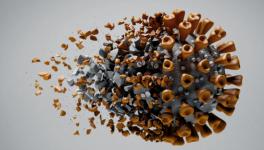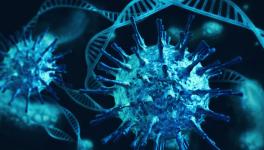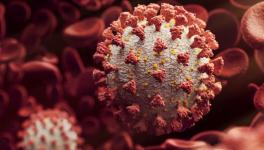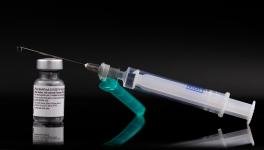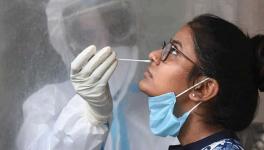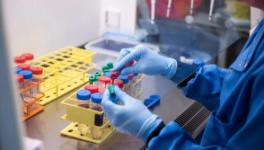COVID-19: Mutations in Virus May Direct it to Escape Existing Vaccines
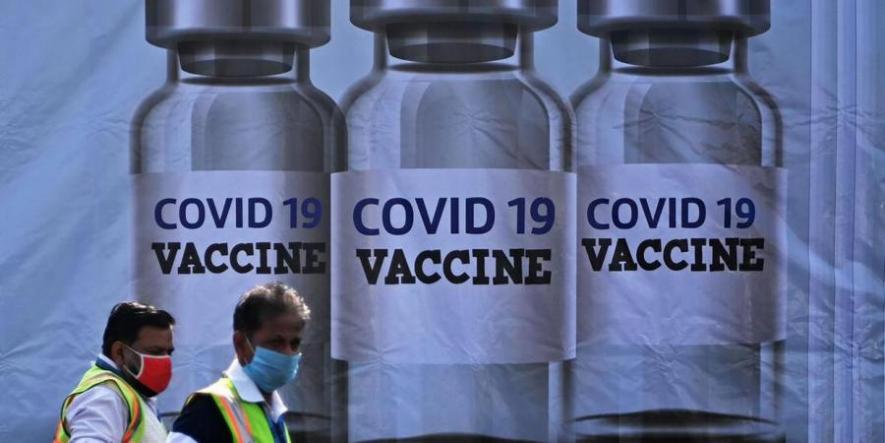
Image Courtesy: AFP
The major concerns vis a vis the COVID-19 pandemic currently are the vaccines and the mutations gained by the virus SARS-CoV-2. Precisely, how effective vaccines would be and how long it will provide an immunity against the virus and whether vaccines that are in use currently would be able to provide a formidable immunity against the mutant variants of the virus are questions that are still intriguing the researchers and scientists.
A research published in Nature on March 8 says that the recent mutations that the novel coronavirus have gained may drive it towards escaping the effects of the vaccines currently in use. This means that the vaccines may not be efficient enough to produce a formidable resistance against the mutant variants of the virus.
The predictions made in the study also draws parallel with the clinical data of the efficacy of some vaccines. For example, the Novavax vaccine showed an efficacy of about 90% when the trials were conducted in UK, but the same vaccine’s efficacy came down to 49.4% in trials of South Africa. Notably, South Africa has most of the COVID-19 cases that are caused by the variant named as B.1.351.
“Our study and the new clinical trial data show that the virus is travelling in a direction that is causing it to escape from our current vaccines and therapies that are directed against the viral spike,” commented David HO, the corresponding author of the study.
He further said, “If the rampant spread of the virus continues and more critical mutations accumulate, then we may be condemned to chasing after the evolving SARS-CoV-2 continually, as we have long done for influenza virus. Such considerations require that we stop virus transmission as quickly as is feasible, by redoubling our mitigation measures and by expediting vaccine rollout."
Vaccination produces antibodies in the body which are specific against the virus. These antibodies can neutralise the virus.
Ho’s team found that antibodies collected from blood samples of people that were given Moderna or Pfizer vaccines were less effective against two of the mutant variants of the virus—the B.1.1.7, that emerged in UK in September last year and the variant B.1.351, that emerged in South Africa towards the end of 2020. They found that against the variant emerging in UK, the neutralisation capacity of the vaccines dropped by 2-fold, whereas, the neutralisation against the variant emerging in South Africa dropped by a staggering 6.5 to 8.5 folds.
Explaining the variability Ho said, “The approximately 2-fold loss of neutralising activity against the U.K. variant is unlikely to have an adverse impact due to the large 'cushion' of residual neutralising antibody activity, and we see that reflected in the Novavax results where the vaccine was 85.6% effective against the U.K. variant.”
However, the drop in antibody neutralisation against the variant emerging in South Africa is more worrisome.
The study also found that another line of dealing with the disease—the monoclonal antibodies, could also suffer in the case of the mutant variants. It found that monoclonal antibodies may not work against the B.1.351 variant (that emerged in South Africa).
Monoclonal antibodies are antibodies that are produced in laboratories from a specific type of cell. A monoclonal antibody is targeted against a specific target and in the case of COVID-19, it is mostly against the spike protein of the novel coronavirus. These antibodies can mimic the real antibodies present in the body and enhance the neutralisation of the virus. Antibodies are basically protein molecules.
The study extensively examined all the mutations occurred in the spike protein of the two variants. The team created SARS-CoV-2 pseudo viruses having all the mutations in the two variants. Notably, the UK variant has eight mutations while the South Africa variant has nine mutations.
It is to be noted that mutations are random changes in the DNA of the virus. All these changes cannot bring out a new variant or a new strain. To be a new strain or a variant, mutations should bring changes in the virulence, contagiousness, survivability or changes in functional aspects of the virus.
Also read: COVID19: What Do Mutation Studies of the Virus Reveal?
Get the latest reports & analysis with people's perspective on Protests, movements & deep analytical videos, discussions of the current affairs in your Telegram app. Subscribe to NewsClick's Telegram channel & get Real-Time updates on stories, as they get published on our website.











